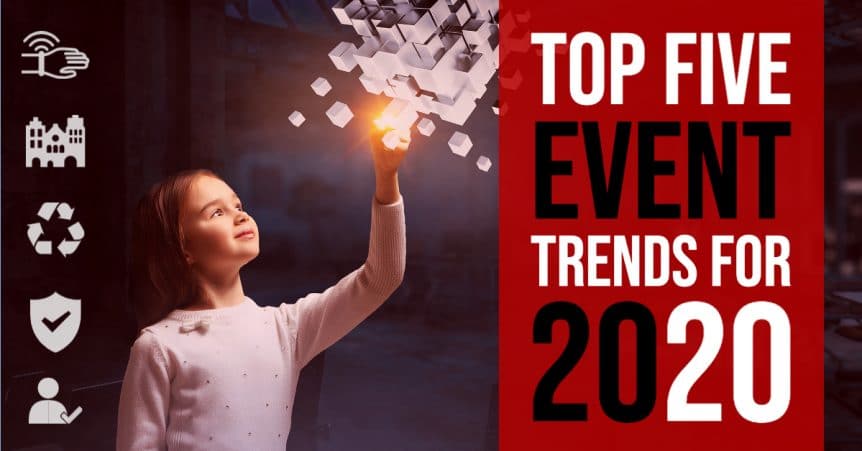As the year quickly comes to an end, let’s take a look at our top five event industry trends for 2020. In doing our research for next year’s trends, we discovered more items than could be listed in just one blog. With that in mind, we took all the lists we found and compiled them down into the five trend topics that seem to be on almost every 2020 trends list out there:
- Unique Venue Selection
- Attendee Personalization
- Emerging Technology
- Sustainability
- Security and Safety
In focusing our list into the big five, we collected trends for 2020 and synthesized them down into an easy and quick way to share them with you. Hopefully, this overview will give you a great place to start your research and decide which trends to put at the top of your to-do list for the coming year.
Let’s get started!
Discovering and Selecting a Unique Venue
Industry experts seem to agree that with an increase in events next year, there will be a corresponding increase in the cost and demand for suitable venues. The overall recommendation is to adjust budgets accordingly and book your sites as early as possible.
More planners are incorporating virtual technologies to research and select venues. Online floor plans, videos, catering menus, capacity information, and more are available for most major venues. Many are also incorporating VR (virtual reality) tours of their facilities and surrounding neighborhoods! Event planners are also utilizing software like SLACK and ZOOM to collaborate with key players to conduct virtual site tours to help narrow their decision without having to take a single flight or Uber ride.
53% of planners stated that moving away from traditional hotel venues to more unique venues was going to be the biggest location trend of 2020. ~ Endless Events 2020 Trends Survey
In determining which venues will be best for your event, look at just a few of the following hot venue trends for attendees in 2020:
Unique Venue Experiences are what attendees are looking for in event locations. That might include industrial lofts, museums, art studios, sports complexes, or even farms. Research not only the venue but the surrounding neighborhood and city cultural opportunities.
Mid-sized City Venues are the rise with increased costs for events. A definite shift from L.A., Chicago, and NYC to cities like Minneapolis, Cleveland, or Des Moines are trending.
Bliesure is the buzzword meaning the importance of combining an affordable destination (business) with attendee desires for vacation-like (pleasure) getaways. Make your event venue a perfect fusion of a business and pleasure trip to increase registrations.
71% off surveyed attendees consider the destination important in deciding whether or not to attend an event. 20-30% name it as THE deciding factor. ~ Experience Institute Research Study
Live Entertainment and Music Festivals are quickly becoming a way to boost engagement, but be aware of requirements and complex logistics that are frequently involved. Cities with vibrant music cultures like Nashville, Austin, Memphis, and New Orleans are popular for this reason.
Accessibility, Diversity, and Inclusion are crucial in this day and age. Making sure your event can cater to such things as the physical, dietary, and language needs of your attendees will go a long way to their overall satisfaction.
The Growing Desire for Attendee Personalization
96% of survey audiences expect events to be more personalized than ever. ~ Social Tables Trends Research
Personalizing the experience for each attendee to get precisely what they need from the event is becoming paramount for success. Data-driven decision making helps to make this possible. By utilizing improved data gathering, with the latest technologies, the industry is shifting from “personas” to actual personalization. Using this valuable information will allow event planners to customize the event for each attendee based on their needs, interests, and desired outcomes. Here are just a few things attendees are demanding for their events:
- Tailored breakout sessions and learning tracks
- Individual activities suggestions
- Customized registration and hospitality options
- Consideration for physical, dietary and cultural needs
- Face-to-Face networking time with vendors and other attendees
- Personalized content, resources, and links
- Easy information and inquiry access
- Wellness and mindfulness initiatives
We created 30,000 attendee experiences versus one experience for 30,000 attendees. And the second we start thinking about it that way, and really put ourselves in the place of the attendee, we make better decisions, and the data just helps us to do that.” ~ Colleen Bisconti, VP of Global Conferences and Events at IBM
Emerging Technology
The adoption of emerging technologies is imperative for today’s event success. Moreover, it is also directly linked to better data collection as well as aiding in attendee personalization. The proper utilization of devices, software and apps will allow attendees to customize their experience, get quick answers to questions and become more engaged and immersed in the event experience. On the flip side, it will allow event planners to gather better and more accurate data for program development, make agenda and schedule updates, create targeted post-event engagement, as well as perform improved ROI measurement. A few of the trending tech areas to consider:
Wearable Tech can become the attendee’s all-in-one hotel key, event badge, access to networking, and even their wallet.
Improved WiFi has shifted from a want to a need in the eyes of attendees. Research your venue’s capabilities carefully, and don’t forget that there are other options if your site has poor capabilities.
Branded Event Apps are still growing in popularity and again offer the opportunity for better personalization and engagement.
Augmented Reality (AR) has now begun to surpass virtual reality. One reason for this is that AR doesn’t require expensive hardware (goggles/headset) because it is primarily software-based and runs on attendees’ smartphones.
A clever event planner can use AR technology as an incentive to drive up app installations and engagement. Although many businesses have caught on to this trend, I predict that there’s still plenty of opportunities available to other businesses if they want to try it as well.” ~ Bryce Welker, CEO, Crush the CPA Exam
5G is on the radar, but not quite here. You should, however, start planning for its arrival as experts project the conversion in the next decade, and the implications (significantly better, safer, and faster than 4G) are staggering.
Artificial Intelligence (AI) tools create efficiencies of time and money and can improve live event management and make the life of an event planner easier. In other words, AI will quickly become the planner’s full-time assistant in future event planning and management.
Event Sustainability
Carbon Footprint of an Event: Travel (73%) / Food & Beverage (12%) / Accommodations (11%) / Venue (3%) / Materials & Waste (1%) ~ University of British Columbia Study
Sustainable initiatives are now the expectation for event attendees. Event planners can reduce waste and impact on the environment while lowering budget expenses. Here are just a few things to start looking into for your next event.
- Eliminate single-use items (utensils, cups, etc.) for reusable items such as cups/mugs which can also double as swag and potential sponsor branding opportunities
- Offer more plant-based catering options
- Use recycled materials and products when possible
- Incorporate digital handouts and resources through event apps and software
- Create smaller or regional events to replace larger ones requiring extensive travel
- Implement event layout design utilizing fewer furnishings and more creative use of lighting and projection
Better Security & Safety
Only 53% of event planners actually have an emergency plan in place. ~ Lori Pugh, Meeting Planners International
Watching the news today drives home the importance of event security and safety. On top of making sure attendees are safe and secure, event planners need to consider the vast amount of data sharing from all the attendees before, during, and after an event. Therefore, it is essential to have a plan that incorporates crisis communication, cybersecurity, and onsite venue security. In addition, technologies such as facial recognition can quickly identify attendees, but also prevent gate-crashers and badge-swappers. Take time in 2020 to beef up your approach to security and ensure a safe and enjoyable experience for all event attendees.
Make 2020 Your Best Event Year Ever
We hope this overview of the Top Five Event Trends For 2020 will help you create better, safer, and more engaging events for the year to come. It was our goal to provide you some insight and direction into the types of venues, technologies, and personalized experiences your attendees will be demanding. Most importantly, please take this information and create some memorable events and lasting impressions in 2020!
Share this Post

